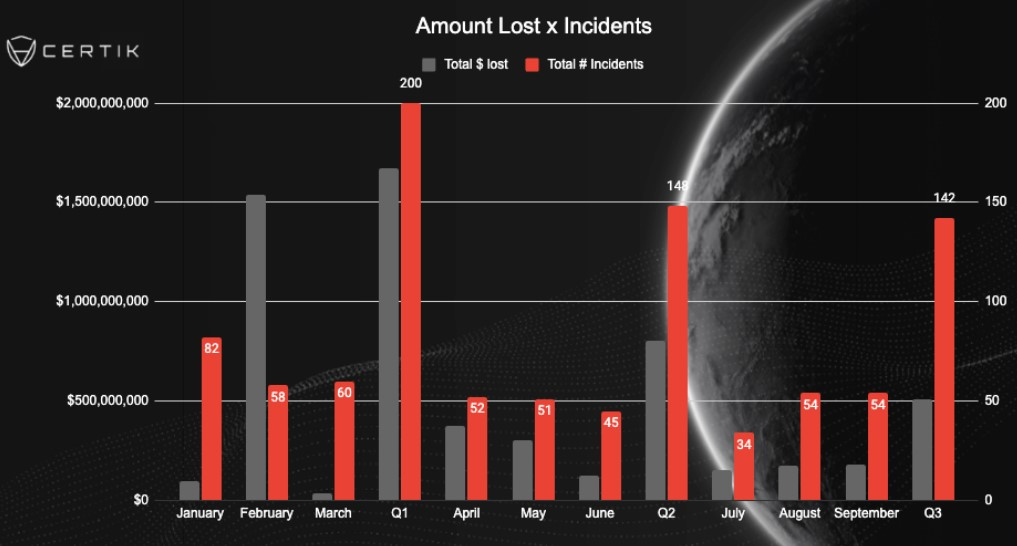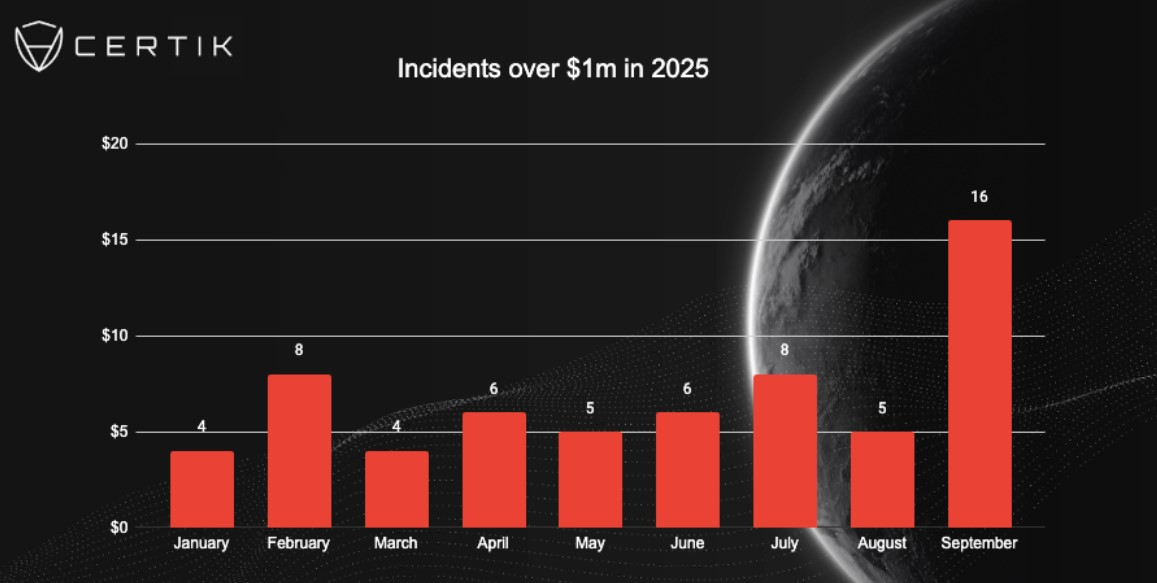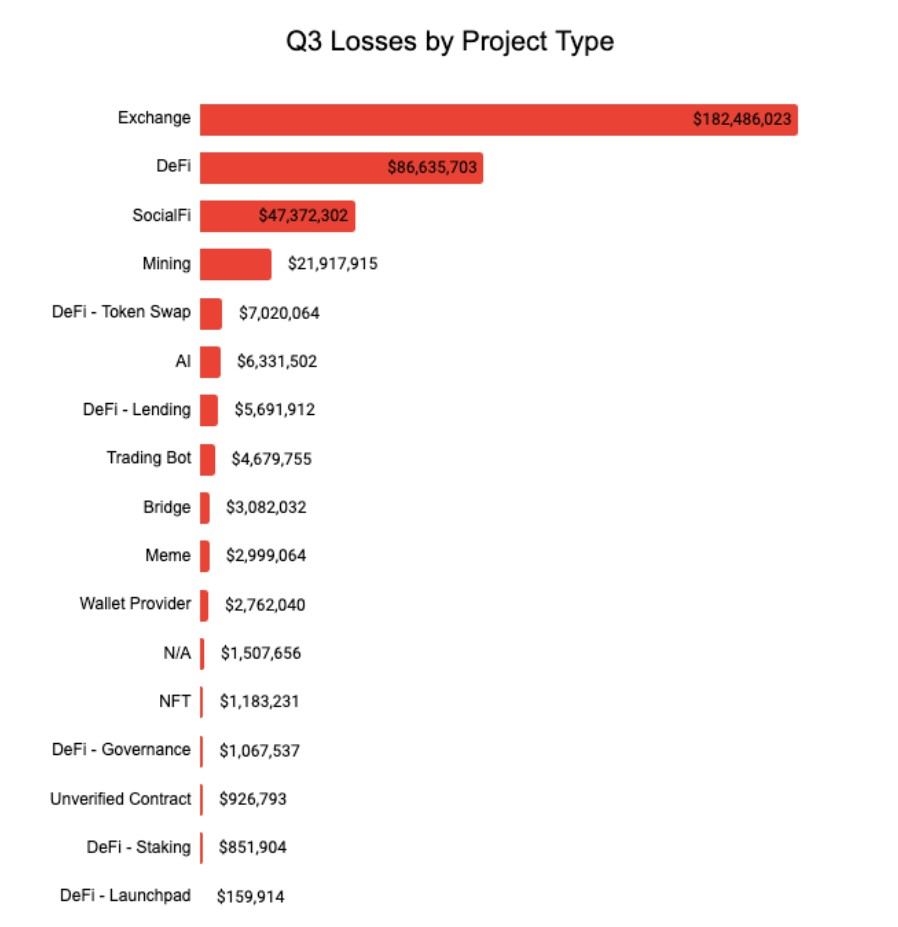
Third Quarter Sees 37% Decrease in Crypto Hack Losses Amid Changing Tactics
In the latest data, crypto hack losses have dropped by 37% in Q3, though September experienced record high million-dollar hacking incidents.
Third Quarter Sees 37% Decrease in Crypto Hack Losses Amid Changing Tactics
Crypto-related hacks saw a decline of 37% in losses for the third quarter, totaling $509 million. Despite a drop in overall losses, September marked a surge in high-value hacking events, particularly in exchanges and decentralized finance (DeFi) sectors.
Key Insights
Total losses from crypto hacks and exploits dropped significantly from $803 million in Q2 to $509 million in Q3. This represents a staggering 37% decrease compared to the previous quarter and a more than 70% decline from the $1.7 billion reported in Q1.
According to CertiK, a blockchain security firm, losses related to code vulnerabilities decreased sharply from $272 million in Q2 to $78 million in Q3. Phishing-related losses also saw a reduction, even with a consistent number of incidents occurring.
Despite the overall decrease, September emerged as the most active month for significant hacks, recording 16 incidents that each resulted in losses exceeding $1 million, surpassing the previous record of 14 incidents in March 2024.
 Total amount lost and total amount of security incidents in 2025. Source: CertiK
Total amount lost and total amount of security incidents in 2025. Source: CertiK
September’s Record-Breaking Data
September’s surge in million-dollar security incidents has raised the average for 2025 to nearly six incidents monthly. This figure, however, remains below the averages recorded in 2023 and 2024, which exceeded eight incidents a month.
While no hacks exceeded $100 million in losses this quarter, analysts observed that attackers shifted focus toward mid-sized exploits.
 Security incidents with over $1 million in losses in 2025. Source: CertiK
Security incidents with over $1 million in losses in 2025. Source: CertiK
Targeted Sectors
CertiK’s report revealed that centralized exchanges incurred the most losses during this quarter, totaling $182 million stolen.
“Centralized exchanges and DeFi projects remain attractive targets for hackers, especially those backed by state sponsorship,” a CertiK spokesperson commented, emphasizing the complicated nature of DeFi that continues to attract hackers.
Moreover, Hacken corroborated this assessment, identifying centralized exchanges (CEXs) as primary targets of the quarter.
 Losses by project type in Q3 2025. Source: CertiK
Losses by project type in Q3 2025. Source: CertiK
DeFi projects ranked second, with $86 million lost in hacks. One notable incident was the hack of the GMX v1 decentralized exchange, which resulted in a $40 million loss; however, the hacker later returned the funds after receiving a $5 million bounty.
“Users should exercise extreme caution when engaging with new ecosystems like Hyperliquid.”
Hacken urged users to remain vigilant when navigating new blockchain ecosystems, citing recent incidents such as the HyperVault exploit and HyperDrive rug pull.
Security Recommendations
Yevheniia Broshevan, the CEO of Hacken, noted that North Korean hacking operations pose the most significant threat, responsible for approximately half of the funds stolen this quarter. She mentioned that hackers have been evolving their strategies, now utilizing sophisticated multi-layered operational breaches instead of basic phishing methods.
Broshevan warned of the necessity for centralized platforms and users exploring emerging chains to tighten operational security and exercise due diligence to prevent becoming easy targets for attackers.
Despite the increase in high-value incidents, the 37% drop in total losses and a 71% decrease in code exploits represent a glimmer of hope, indicating that the industry’s efforts to reinforce code security are beginning to yield results.
For further insights, read about how different global religions perceive Bitcoin and cryptocurrency.


